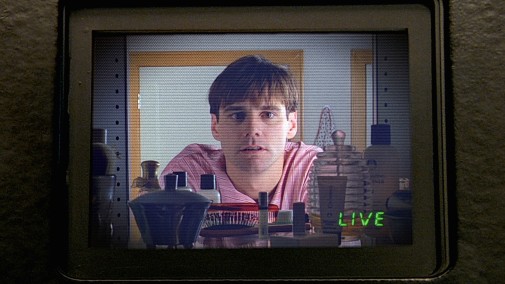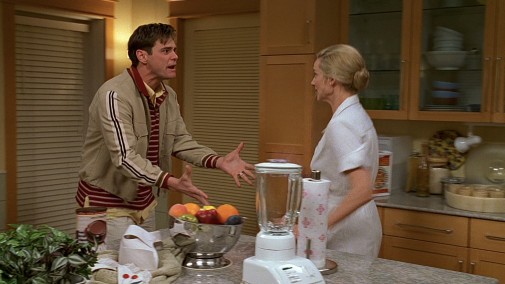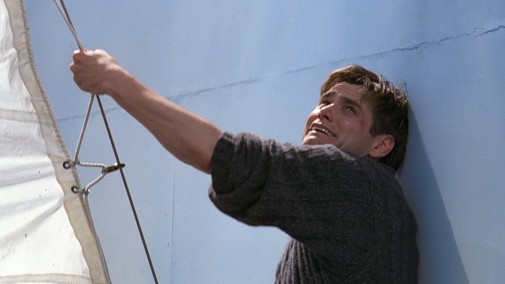Almost There: Jim Carrey in "The Truman Show"
 Tuesday, July 20, 2021 at 6:30PM
Tuesday, July 20, 2021 at 6:30PM After a two-week hiatus, the Almost There series is back!

Blessed with an elastic face that can as easily twist into a clownish visage or a mask of tragedy, Jim Carrey is an actor prone to exaggeration. His maximalist tendencies don't always work, but they're sure to leave a lasting impression, whether playing up his funnyman routine or trying another register. While his legacy is built on comedies, awards bodies have responded better to Carrey when he's stretching himself as a dramatic performer. After his star rose with vertiginous speed in the mid-90s, the actor's first real foray into the Oscar race happened in 1998. It was then that, working with director Peter Weir, Carrey found the point where sitcom disintegrates into existential crisis, using his comedic skills to trace an odyssey of self-discovery. Despite AMPAS' marked disinterest, The Truman Show is one of Jim Carrey's greatest achievements…
"There's nothing fake about Truman himself." Such words are spoken by the creator of The Truman Show, the TV hell inside Weir's satire against reality television, and the evils of corporations' control of human lives. Since birth, the titular protagonist has lived inside a massive studio set, an entire town populated by actors that perpetuate the illusion of normalcy. Nothing is true about the spectacle except for the human at the center. Introduced as he looks at himself in the bathroom mirror, Jim Carrey's Truman is just like his in-movie audience. He searches for escapism in the fantasy of another life, playacting a character of his imagination. That's what his multiple direct-address mirror monologues are about, an honest and naked need for something different from the ordinary.

It's a testament to Carrey's performative finesse that we're aware of how intimate these passages are and, consequently, how intrusive the camera's gaze is. The spastic artifice of Truman's social acting is absent altogether from these scenes, telegraphing the honesty of the man's daydreams. After all, this is a performance all about establishing different levels of selfhood – who Truman is to others and himself. All of us are composed of different masks, several selves that juxtapose and interchange, a miasma of personality segmented into facets, some of which are not for public consumption. Carrey's Truman has those facets too, but the prevailing vigilance of reality TV robs him of secrecy. Even the little things that are just for himself are unwitting pageantry for strangers' eyes. His life doesn't belong to him.

The dynamic exists in big gestures like how the mirror monologues end on a note of switching faces, as the man exits his private space and walks into the domestic stage. However, it also manifests in subtler nuances, like the modulated vocal variations of his office dialogues. When chit-chatting his way through conversations, Truman is in auto-pilot, but then a little surprise may startle him out of the routine. Carrey's façade crumbles for a millisecond, his eyes drift downward, and his quasi-singing delivery becomes a swallowed whisper. Just as it comes, it goes, but the actor's craft and Weir's voyeuristic visuals make sure we notice. Nevertheless, it's in the conversations with mother, wife, and best friend, as the lie starts to crumble, that Carrey showcases his most complicated tone management.
The full-on start of Truman's epiphany of derealization is an instance when the comedian's demonstrative physicality evokes a sort of balletic grace. Quiet paranoia crackling into a shattering of curiosity, it's a dance of anxiety transforming into euphoria. On the afterglow of the sequence, subsequent interactions become clouded by suspicion. One senses that, logically, this panic should feel claustrophobic, but watching Carrey letting lose is to taste liberation laced by hateful fury. Whatever complicity he might have felt for his wife has soured into distrust and, after a photobook discovery, his every scene with Laura Linney's electric ball of nerves and manipulations is tainted by rage. It's an ugly side of the character, borderline violent, something you'd expect a mainstream comedy star to sand down. Instead, Carrey does the exact opposite, leaning into the crispation choleric betrayal, sharpening the characterization's edges.

Later on, when talking to his best friend, Truman is aware and fooled by all the lies flying around - a paradoxical state. Carrey's teary-eyed nods, the repetitive reaction, almost seems to indicate that Truman wants to believe and, at that moment, is willing to fall for it. It's fascinating to note that this scene signals the transition of The Truman Show into a two-hander between Ed Harris's god-like eye in the sky and Carrey's unwilling TV star. Just as we arrive at a pinnacle of actorly vulnerability, Weir pushes against the audience's emotional engagement. A wall of alienation manifests, and biting cynicism undercuts Truman's melodrama. Such mechanisms could jeopardize the efficacy of the leading man's performance, but the contrary is true.

We're suddenly thrown outside the boundaries of Truman's inner-life as Carrey makes all of his subsequent quotidian performance into a self-aware act of fakery. It's startling, all the more unnerving because, during the first hour of The Truman Show, we've been trained to appreciate the specificities of the leading man's many levels of selfhood. Even before Truman evades the TV producer's schemes, the audience understands that something's wrong, that we're witnessing the prelude to an escape. His evasion is no surprise. When we finally find him again, Carrey has let go of mannerism and his Matryoshka performance within a performance, sublimating all of Truman's character into an unstoppable desire for freedom.

He's going to drown, but he doesn't even care. Death would be preferable to a life lived like this, imprisoned and forever observed. The dialogue points this out, but Carrey's performance confirms it. Hitting the outer walls of his prison, Carrey gives the words human weight. At that moment, he embodies an aching need for deliverance and the refusal of any other alternative. Finally, to top it all off, Carrey gets to play Man's confrontation with his Creator. What does he do then? The actor weaponizes his own quirkiness as a performer and makes Truman's last on-screen minute into an act of defiance. He spits the falsity of his life back unto the faces of those who devised it. When the movie's allegory threatens to topple itself into po-faced absurdity, Carrey makes it work. He adds an astringent note of barbed comedy, takes a bow, and leaves.
All that said, as much as one admires the performance, it's not a seamless monument of perfection. At this point in his life and career, Jim Carrey was not exceptionally skilled at reproducing the youthful innocence of a feckless teen. Apart from his evocations of lovesick longing, the flashbacks to Truman's early years find the actor indulging in an unnecessary mugging, confusion of social codes that don't quite fit the more nuanced version of the character as an adult. During cycles of dull routine, the adlibs don't always work either, sometimes tainting Truman's character with a mean streak that's less dramaturgically productive than his husbandly cruelty. Still, these are minor setbacks of an otherwise superb effort.

In the 1998/9 awards season, Jim Carrey got some traction in the race for the Best Actor Oscar. Amidst critics' honors and other such plaudits, his most significant get was a Golden Globe victory in the Drama category. Indeed, Carrey beat three of the eventual Oscar nominees. However, when nomination morning arrived, The Truman Show slightly underperformed, scoring only three nominations – Best Director, Supporting Actor, and Original Screenplay. Instead of Carrey, AMPAS picked Roberto Benigni in Life is Beautiful, Tom Hanks in Saving Private Ryan, Ian McKellen in Gods and Monsters, Nick Nolte in Affliction, and Edward Norton in American History X. The Italian actor would take home the trophy while Jim Carrey remains Oscarless to this day. Despite multiple opportunities, the Academy never embraced the actor, not when he had precursor love or even when they gave other awards to his movies.

The Truman Show is streaming on Fubo TV, AMC+, DirectTv, and Spectrum on Demand. You can also rent the movie on most platforms.



Reader Comments (18)
It's a modern classic and better than any film in the Oscar Top 5.
I need a rewatch now after reading this,Carrey was worthy two more times and nothing.
His ascension if you were around in 1994 was the equivalent to Julia in 1990.
His work in this and Eternal Sunshine of a Spotless Mind is nothing short of extraordinary. While the man does ham it up in comedies he sure does know how to dial it back. In fact his comedic strengths even enhance the dramatic performances of these films.
I would’ve given The Truman Show more nominations than it actually got—probably 6 or 7 in total—yet I’m not sure Carrey would be one of them. The flaws in the performance that you pointed out are ones I agree with, and while I also agree on the point that they’re minor flaws that certainly don’t ruin an otherwise very good characterization, I just can’t find room for him in my Best Actor top 5 that year, particularly since I consider 1998 a really strong year for that category. The buzz around this movie when it came out was largely based on it being Carrey’s first big serious role, but in retrospect, his performance—good as is—isn’t even the first thing that comes to mind when I think of this film. I consider it more a feat of directing, writing, and editing than acting.
Edwin: Haven't seen Gods and Monsters or Affliction (though I suspect those would make my top 10, but not higher than that). My personal ballot, right now, is:
Jeff Bridges, The Big Lebowski
Jim Carrey, The Truman Show
John Goodman, The Big Lebowski
Edward Norton, American History X
Jason Schwartzman, Rushmore
(Johnny Depp, Fear and Loathing in Las Vegas and Jim Caviezel, The Thin Red Line being the close but no cigar guys. Was kind of neutral on Hanks (Its a very "Gene Hackman in The French Connection" performance. He doesn't do "badly", but...acting nomination...?) and HATED Benigni.)
Quite honestly, Carrey is an acquired taste. In 1998, I would have been intrigued to see Truman Burbank played by Woody Harrelson or Robert Downey, Jr. Either is terrific and would have elevated the role and evoked pathos without so much obvious effort.
"Rubber-Faced Fartsmith is America's Sweetheart"
-- The Onion
I never saw Nolte, but Benigni/Hanks/McKellen/Nolte/Norton is a tough lineup to crack. I like Life is Beautiful more than most people on the Internet, but even if I didn't, that was an era of peak Miramax, and Benigni would not be denied at least a nomination.
I remember that nomination morning, and Norton's inclusion (with few precursors and no other Oscar nominations for American History X) felt like a real victory. As did the nominations The Truman Show did get, for Ed Harris, Peter Weir, and Andrew Niccol. Getting Carrey in as well might have been too much to ask of the Academy.
You don’t need Benigni or Nolte in this lineup. Carrey should definitely have made it in. The entire last act is a master class in toning down his “rubbery” tendencies into a soulful meditation on existence.
I remember when Carrey won and said in his speech that he was then a shoo-in for the Blockbuster Award...and then proceeded to lose the Blockbuster Award! I also remember Carrey being so heavily praised for showing that he could be more restrained, but the more restrained performance actually wasn't that impressive. Personally, I found all of the actors playing two roles (Laura Linney, Noah Emmerich, and especially Natascha McElhone) to be much more impressive and interesting. I also found Carrey to be much more impressive in Man on the Moon, when he had the chance to show a fuller range. The 1998 lineup is pretty good as is and I suspect Joseph Fiennes was closer to getting swept in for Shakespeare in Love than Carrey ultimately was.
What a shame comic actors are mostly praised for dramatic roles. His performance in this is great no doubt about it but for me the MVP and biggest snub is Laura Linney. The perfect complex role for the most perfect smile.
I always gonna be more a fan of comic actors getting lose and the best performances of Jim Carrey in which he developes his gestual lunacy are Me, Myself and Irene (my favorite), How the Grinch Stole Christmas and Ace Ventura: Pet Detective.
K, E, A.
@Volvagia
There has been heated opinions written here about whether a gay actor should play gay characters. The extraordinary Ian McKellen plays gay director James Whale in the bio pick Gods and Monsters. As much as one may admire William Hurt in Kiss of the Spider Woman or Tom Hanks in Philadelphia or Heath Ledger in Brokeback Mountain or Trevante Rhodes in Moonlight, there is sublime truth that McKellen, a gay actor, brings to the story of an established Hollywood filmmaker who lives a decidedly open lifestyle nearly a century ago. McKellen richly deserved the Oscar. You do yourself a disservice to not experience such masterful artistry.
Looking at the five nominees, it is hard to pick the one that could be removed.
Nolte and McKellen were widely admired for their respective performances
Tom Hanks was the lead of the Best Picture frontrunner and had a second (romcom) performance that year
If an actor gets Directing and Writing nominations, the Acting Branch is not going to deny an actor a third nomination especially for a Holocaust dramedy
Ed Norton proves the rule that it is better to be loved by 15% than liked by 100%
I think Carrey was better than the winner, and I think his film was MUCH better than the winner's film. I don't know how close he actually was to the nomination, though.
This snub really hurts so much.
I'll never get over it....
The Truman Show is a masterpiece that deserved nominations across the board.
My Best Actor Line Up 1998...
Roberto Benigni, La Vita é Bella
Jim Carrey, The Truman Show
Nick Nolte, Affliction
Ian McKellen, Gods & Monsters
John Travolta, A Civil Action 7 Primary Colors
winner: Benigni. 2nd McKellen. 3rd Travolta. 4th. Nolte. 5th. Carrey
(6th: Luis Ciges, El Milagro de P. Tinto)
I think that probably both Fiennes and Travolta were closer to the nomination than Carrey.
In hindsight it seems like HFPA bent over backwards to honor him for "becoming a dramatic actor" after a string of comedy hits...
He. Should. Have. WON. Point blank period.
The fact that he was not even nominated is just atrocious.
I remember being 7 years old and seeing this in theaters. I was mesmerized by Carrey and the film. It felt so real and honest. The people watching were the same ones watching The Truman Show...we wanted him to win.
On a side note...Carrey was at the top of his game, and no one could have pushed that movie to do $125 million (which is like $200 mil today) in the States and $250 million worldwide.